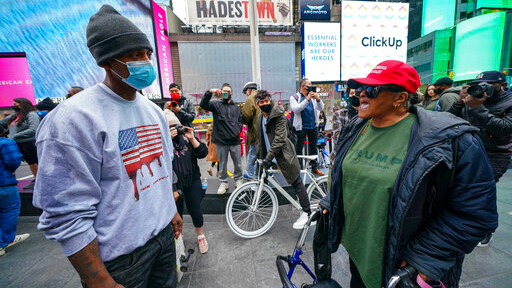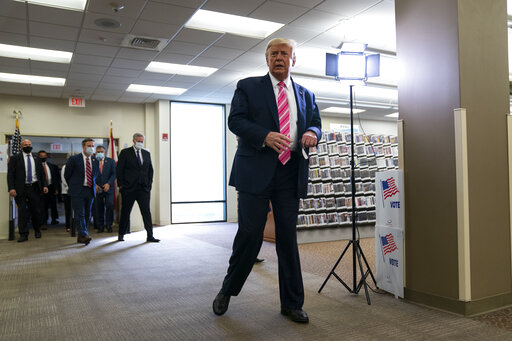
Trump supporters and anti-Trump protesters collide at a rally in New York, U.S., October 25, 2020. /AP
Trump supporters and anti-Trump protesters collide at a rally in New York, U.S., October 25, 2020. /AP
Editor's note: Hannan Hussain is a foreign affairs commentator and author. He is a Fulbright recipient at the University of Maryland USA and a former assistant researcher at the Islamabad Policy Research Institute. The article reflects the author's opinions and not necessarily the views of CGTN.
U.S. President Donald Trump wasn't teasing when he refused to commit to a peaceful transfer of power in November. His resistance to the integrity of the U.S. elections now reflects in the empowerment of dozens of far-right militias, most anticipating "leftist coups" and echoing Trump's calls for disruptive activism. Campaign members are lobbying hard to discredit ballots in pivotal battleground states, openly contesting courts and pushing police forces to beef up security arrangements across thousands of polling sites.
A joint report by the Armed Conflict Location & Event Data Project and MilitiaWatch this week captures the dichotomy between divisive election rhetoric and post-election violent extremism risks.
"Their [far right militias'] actions, planned and executed, extend to the U.S. election and beyond, and many of these groups … engage in widespread activities throughout the U.S. and transcend state borders," noted the 30-page report.
Adding to the challenge is the fact that most of these groups have no demonstrated memory of reacting to prior election deadlocks, allowing them to pass as low-priority threats with meager condemnation under the current administration.
As Trump's campaign rhetoric continues to polarize public views on vote count legitimacy, major hardline groups are using the leeway to realign their far-right identities with Trump's confrontational brand of politics.
The colossal vote-count operation in Pennsylvania – widely regarded as Trump's springboard to presidency – alone captures this convergence. Despite the president's repeated assurances of a safe and healthy post-election future in the state, citizens have armed themselves in record numbers to effectively take legal protections into their own hands.
Prospects for overcoming voter trust deficit also appear minimum as the president instructs the State Department to suspend all training programs for employees related to diversity and inclusion. The exercise – a model for peace-time motivations across key battleground states – extended critical lessons on prevailing racism and white privilege in America. The Trump administration's decision to deem it a "fundamentally racist or sexist" impression sends a powerful message on post-election peace priorities.

President Donald Trump speaks with reporters after voting at the Palm Beach County Main Library in Florida, U.S., October 24, 2020. /AP
President Donald Trump speaks with reporters after voting at the Palm Beach County Main Library in Florida, U.S., October 24, 2020. /AP
One reason it will be difficult to determine the effectiveness of law enforcement agencies on November 3 is the political divide on mail-in voting.
On the one hand, the Democrats have framed the mail-in voting process as broadly dependable, safe and secure, refusing in part to give into Trump's claims of an inevitable fraud. On the other hand, the Trump campaign – with occasional backing from the GOP – is taking the fight to state courts, benefiting from rulings that have blocked extended-period ballot counts in select states after election day.
As both sides fight opposite ends and deploy thousands of election-monitoring volunteers as their self-proclaimed counterweights, both campaigns seem to miss the real point: establishing the legal case for mail-in voting. Its absence has ceded greater space to public distrust vis-a-vis the elections and bolstered Trump's objective of doubling down on ballot fraud.
In a major plus for his election offensive, an NBC News/SurveyMonkey poll this month also counted over half of the American population with similar skepticism.
Conventional wisdom suggests that a boost in impartial law enforcement conduct could help de-escalate election-day frictions at the municipal, state and federal levels. Detailed observations from Amnesty International show that protective covers against voter intimidation and coordinated vigilantism have been broadly absent at the hands of the police in almost 200 recent instances. Independent research further illustrates that politically viable far-right groups can strengthen these challenges by operating as a multi-racial front at critical junctures.
But any position of strength for the police is directly undermined by the Trump administration's own partisanship at the top of the decision-making ladder. Internal records reviewed by Reuters earlier this month found a slate of proposals under the president's law enforcement commission that bolstered due-process protections for officers "accused of wrongdoing," dismissing voter protection as an afterthought. Fresh calls to galvanize right-wing supporters to the polls, all in the name of "ballot security," threaten to drive a bigger wedge between historically consistent vote-processing frameworks in America and the relative minority of citizens that bank on institutions to deliver democracy.
"The radical left are laying the groundwork to steal this election from my father … We need every able-bodied man and woman to join Army for Trump's election security operation," echoed Trump's eldest son Don Jr in a widely circulated advertisement.
As those that occupy the polls claim their oversight as a liberation struggle, it would become increasingly difficult to establish voter suppression in one of the largest democracies in the world.
(If you want to contribute and have specific expertise, please contact us at opinions@cgtn.com.)